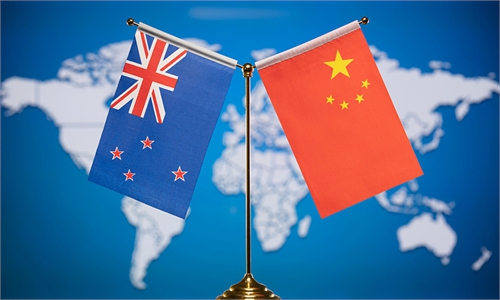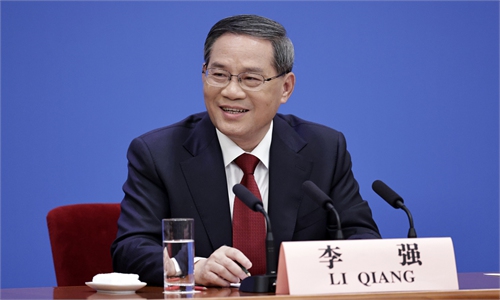
Illustration: Chen Xia/GT
Editor's Note:Chinese Premier Li Qiang will visit Australia from Saturday to Tuesday, according to an official statement from the Australian government. This marks the first visit by a Chinese premier since 2017. Since Prime Minister Anthony Albanese took office in 2022, Australia has returned to a more rational path of seeking pragmatic cooperation with China. Despite starting from a low base, the relationship between China and Australia has improved significantly, said Mark Beeson (Beeson), an adjunct professor at the Australia-China Relations Institute, University of Technology Sydney, in an interview with Global Times (GT) reporters Xia Wenxin and Xing Xiaojing. Beeson also pointed out the great impact China-US relations has on the relationship between Beijing and Canberra, urging the Australian government to take a more independent approach in terms of foreign policy.
GT: How do you view the interactions between Chinese and Australian high-level officials since the beginning of this year? What kind of signals do they send?
Beeson: The relationship between China and Australia has improved significantly, although it started from a pretty low base. The former Scott Morrison administration's approach to China was needlessly and unproductively belligerent and primarily aimed at audiences in Australia and Washington. The Albanese administration has made a real, and largely successful effort to repair the damage and reset the relationship. However, the enthusiasm with which Albanese endorsed Morrison's AUKUS initiative was misguided, unlikely to do anything to enhance Australia's overall security and has created an enduring obstacle to Australia playing an independent regional role or developing closer ties with China.
On the plus side, China's appointment of Xiao Qian as the new ambassador to Australia has been very well received. Hopefully, this will allow for a much more rational and reasonable dialogue between two countries that are bound together by geography. So, the signs are potentially good. The challenge is to build on areas of mutual interest and opportunity, such as addressing climate change, which remains the principal threat to the well-being and security of both countries and is an obvious but underdeveloped opportunity for "win-win" cooperation.
GT: How do you see the future development of China-Australia relations? Can Australia somehow maintain a balance between the security alliance with the US and economic and trade cooperation with China?
Beeson: China-Australia relations have the potential to become either very good or very bad. Given the goodwill on both sides there is no reason why the relationship cannot continue to improve, but much will depend on how the relationship between the US and China develops.
It's no secret that both the major political parties in Australia prioritize the strategic alliance with the US above everything else. In the event of a conflict over Taiwan's future status, there is no doubt that Australia would actively support the US as it always does. Consequently, Australian foreign policy is dependent on what happens in Washington, even if that includes the return of Donald Trump. While this may force a rethink about policy priorities in Canberra, most policymakers and analysts in the "Canberra bubble" cannot imagine a reality in which Australia does not demonstrate its unswerving fealty to the US.
The great hope is that this will not complicate economic relations with China, although this may be wishful thinking. If the US intensifies its trade war against China, Australian policymakers will be placed in a very difficult position. Australian policymakers could take a more independent foreign policy stance and "hedge" between the two great powers, as the ASEAN member states do. However, it is difficult to see either of the main political parties having the courage or imagination to take this monumental step. The fact that both parties are enthusiastic supporters of AUKUS means that there will be little room for maneuver when it comes to balancing strategic and economic priorities.
GT: Recently, five major Australian beef exporters that had been suspended from exporting meat to China since 2020 have resumed. What role do you think this change plays in promoting China-Australia economic and trade exchanges?
Beeson: Australia is highly dependent on the international economy and has little influence over events that may have a major domestic impact. Given that trade accounts for something like 45 percent of Australia's GDP and one in five jobs, anything that affects international trade is a major concern for Australian policymakers and producers.
The resumption of beef exports will obviously be welcomed by producers and policymakers alike. However, beef is only a relatively minor part of Australia's trade with China. Significantly, iron ore, easily Australia's largest single export, was unaffected by the dispute between China and Australia. Not only was this welcomed, but it was also a useful reminder that trade interdependence is potentially a good thing that cuts both ways. Some imports are too important and difficult for China to easily replace, and this helped to give some much needed ballast to the overall relationship.
Likewise, Australian enthusiasm about joining the US in its misguided efforts to "contain" China may be tempered by recognition of the continuing importance of its principal trade partner. Indeed, Premier Li can be assured of a very warm welcome in Perth, as the resource trade with China is rightly recognized by both business and political elites as vital to the state's future prosperity.
GT: We know that you recently gave lectures and participated in exchanges at various Chinese universities, including Nanjing University and Sun Yat-sen University. What is your impression of the Chinese students and scholars? What do you think of the people-to-people exchanges between our two countries?
Beeson: I consider myself very fortunate to have had the opportunity to visit China many times and have longstanding friendships and academically productive relations with quite a few Chinese scholars as a result. These sorts of exchanges are very valuable, not only because they are so enjoyable! It is vital that we develop a better understanding of our very different societies and histories if bilateral relations are to remain cordial and deepen.
People-to-people exchanges are an important part of this process for both scholars and students. I was delighted to find that frank and open discussions about even the most sensitive of topics are still possible and even welcomed. Students in particular seem willing to contemplate a range of different ideas about the future, especially regarding how to deal with the challenge of climate change. In this regard, they are not so different from their counterparts in Australia. Young people everywhere are beginning to recognize that unless we have much greater levels of cooperation rather than competition, their futures will look far from certain.
One thing that is noticeably different, however, is that people from all walks of life in China seem proud of the country's remarkable achievements, especially economically and even environmentally. Also, there is a sense of disappointment that this is not more widely recognized and acknowledged internationally. Many students I met hoped that China can play a greater role in encouraging other countries to follow its example in adopting green energy. The challenges we face remain enormous and unprecedented, but unless a better-informed basis for collaboration is developed, the "international community" is unlikely to make adequate progress in the limited time available.
GT: In an article published on Australian online news outlet Crikey in March, you commented that the China paranoia of the Australian Security Intelligence Organisation (ASIO) is "hypocritical." Could you please tell us more about this story? Is such China paranoia common in other Australian authorities? What effect do you think this type of mentality will have on the bilateral ties?
Beeson: The incident I wrote about in Crikey was a minor, but nonetheless revealing, counterproductive and unnecessary episode in the history of China-Australia relations. Unfortunately, it does reflect a level of paranoia among Australia's strategic elites, security agencies, influential news outlets and senior policymakers. Anyone not subscribing to this dominant view - like me - is considered to be a naive "panda hugger" at best, and actively disloyal at worst.
The consequences of the dominant security discourse about the "China threat" were on full display when ASIO harassed and intimidated one of my former PhD students during a routine research trip to Australia. Given his principal research interest is China-Australia relations, it's hardly surprising he would want to visit and see what's happening in a country he has great affection for. Indeed, from an Australian point of view, he is precisely the sort of China-based commentator, with an insightful and balanced view of what's happening here, we need to encourage. Yet given the uniformity of opinion among Australia's strategic establishment, it is difficult to see how instinctive mistrust will be easily overcome, which is why personal ties are potentially so important.
To be fair, the job of all security agencies around the world is to be professionally paranoid, but this should not stop them from being able to differentiate between real and imagined threats. Harassing innocent academics - even retired ones - makes Australia look foolish, especially as it claims to be an upholder of individual liberty, freedom of speech and the rules-based international order. Sometimes actions really do speak louder than words.


